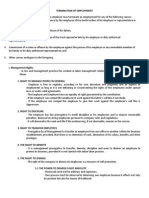Just Causes of Termination
Just Causes of Termination
Uploaded by
Fides Et RatioCopyright:
Available Formats
Just Causes of Termination
Just Causes of Termination
Uploaded by
Fides Et RatioCopyright
Available Formats
Share this document
Did you find this document useful?
Is this content inappropriate?
Copyright:
Available Formats
Just Causes of Termination
Just Causes of Termination
Uploaded by
Fides Et RatioCopyright:
Available Formats
Definition
Just causes for dismissal of employee may be defined as those lawful or valid grounds for termination of employment which arise from causes directly attributable to the fault or negligence of the erring employee. Just causes are usually serious or grave in nature and attended by willful or wrongful intent or they reflected adversely on the moral character of the employees.
As opposed to authorized causes under Article 283 wherein the termination of employment is dictated by necessity of the business, the dismissal under just causes is imposed by the employer to the erring employee as a punishment for the latters acts or omission. Just Causes Under the Labor Code
Just causes for termination under the Labor Code is found in Article 282 and enumerated here as follows: Serious misconduct. Serious misconduct is an improper conduct willful in character and of such grave nature that transgressed some established and definite rule of action in relation to the employees work. Willful disobedience to lawful orders. The employees are bound to follow reasonable and lawful orders of the employer which are in connection with their work. Failure to do so may be a ground for dismissal or other disciplinary action. Gross and habitual neglect of duties. Gross negligence has been defined as the want or absence of or failure to exercise slight care or diligence, or the entire absence of care. It evinces a thoughtless disregard of consequences without exerting any effort to avoid them. Fraud or willful breach of trust. Fraud is any act, omission, or concealment which involves a breach of legal duty, trust, or confidence justly reposed and is injurious to another. Commission of a crime or offense. Commission of a crime or offense by the employee against his employer or any immediate member of his family or his duly authorized representative, is a just cause for termination of employment. Analogous causes. Other causes analogous to the above grounds may also be a just cause for termination of employment. Examples of Analogous Causes
Abandonment. Abandonment of job is a form of neglect of duty. There is abandonment when the employee leave his job or position with a clear and deliberate intent to discontinue his employment without any intention of returning back. Gross inefficiency. Gross inefficiency is analogous to and closely related to gross neglect for both involve acts or omissions on the part of the employee resulting in damage to the employer or to his business. (See Lim vs. NLRC, G.R. No. 118434, July 26, 1996.) Disloyalty/conflict of interest. Disloyalty exists when one asserts an interest, or performs acts adverse to ones employer, such as secretly engaging in a business which renders him a competitor and rival of his employer. It constitutes a breach of an implied condition of the contract of employment. (See Elizalde International vs. Court of Appeals, G.R. No. L40553 February 26, 1981.) Dishonesty. Acts of dishonesty deemed to be patently inimical to the employer is analogous to breach of trust and is a valid cause for termination of employment. No Separation Pay
An employee who is terminated from employment for a just cause is not entitled to payment of separation benefits. Section 7, Rule I, Book VI, of the Omnibus Rules Implementing the Labor Code provides:
Sec. 7. Termination of employment by employer. The just causes for terminating the services of an employee shall be those provided in Article 282 of the Code. The separation from work of an employee for a just cause does not entitle him to the termination pay provided in Code, without prejudice, however, to whatever rights, benefits and privileges he may have under the applicable individual or collective bargaining agreement with the employer or voluntary employer policy or practice.
Last Edited: Friday, August 19, 2011 Caveat: Subsequent court and administrative rulings, or changes to, or repeal of, laws, rules and regulations may have rendered the whole or part of this article inaccurate or obsolete.
You might also like
- Guarantee LetterDocument1 pageGuarantee Letterjlj generalNo ratings yet
- Retirement PlanDocument11 pagesRetirement PlanAlvino YaraNo ratings yet
- 14 Training Costs AgreementDocument2 pages14 Training Costs AgreementJohna Mae Dolar EtangNo ratings yet
- Separation Agreement: The COMPANY Inc., A Corporation Duly Organized and Existing in Accordance With TheDocument1 pageSeparation Agreement: The COMPANY Inc., A Corporation Duly Organized and Existing in Accordance With TheNasir AhmedNo ratings yet
- IML LawsuitDocument3 pagesIML LawsuitThe News Report Daily100% (1)
- TORTS Spring 2011-Professor Goold Summary Notes On Negligence (Edited) Prepared by Simon Lin Based On Professor Goold's Summary NotesDocument46 pagesTORTS Spring 2011-Professor Goold Summary Notes On Negligence (Edited) Prepared by Simon Lin Based On Professor Goold's Summary NotesJuliana MirkovicNo ratings yet
- 282 Termination of EmploymentDocument6 pages282 Termination of EmploymentPhilipBrentMorales-MartirezCariagaNo ratings yet
- Nte - Peak TemplateDocument2 pagesNte - Peak TemplateMariz GalangNo ratings yet
- GynegologicalDocument1 pageGynegologicaltristan_adviento32No ratings yet
- 1 ProbationaryDocument9 pages1 ProbationaryWeknowNah Galeos AlicayaNo ratings yet
- Ethical StandardsDocument30 pagesEthical StandardsDionicel OlitresNo ratings yet
- Affidavit of Loss - KuyaDocument3 pagesAffidavit of Loss - KuyaGail FernandezNo ratings yet
- Leave For Victims of Violence Against Women andDocument2 pagesLeave For Victims of Violence Against Women andJhoana Jane FondevillaNo ratings yet
- Republic of The Philippines) - ) S.SDocument2 pagesRepublic of The Philippines) - ) S.STerence Eunice CeñirNo ratings yet
- Legal Opinion, Regular Seasonal EmployeesDocument4 pagesLegal Opinion, Regular Seasonal EmployeesJo Tr Avelard DvNo ratings yet
- Date Paid Period Covered Amount Reference: Samson A. Lato PresidentDocument1 pageDate Paid Period Covered Amount Reference: Samson A. Lato PresidentClarine BautistaNo ratings yet
- Locker Accountability Form v7Document2 pagesLocker Accountability Form v7karina abyysNo ratings yet
- Activity Waiver Form (Cepo-F02)Document1 pageActivity Waiver Form (Cepo-F02)Patricia Da-antonNo ratings yet
- Attendance PolicyDocument1 pageAttendance PolicyMarielle CuriosoNo ratings yet
- Demand Letter: Francis EbioDocument1 pageDemand Letter: Francis EbioAcads FilesNo ratings yet
- Equipment Liability FormDocument2 pagesEquipment Liability Formxavian.smitNo ratings yet
- I. Definition of Immorality: Iii. OnDocument6 pagesI. Definition of Immorality: Iii. OnPrincess Aileen EsplanaNo ratings yet
- Regularization Contract LaurenteralphDocument3 pagesRegularization Contract LaurenteralphRalph Ian LaurenteNo ratings yet
- Notice of RetrenchmentDocument1 pageNotice of RetrenchmentVienna Eleize PortillanoNo ratings yet
- Sample NTEDocument2 pagesSample NTEChika TolentinoNo ratings yet
- Waiver of Liability FormDocument1 pageWaiver of Liability FormKentucky Baptist FellowshipNo ratings yet
- List OF Requirements: Employees' Compensation CommissionDocument2 pagesList OF Requirements: Employees' Compensation Commissionjmmos207064100% (2)
- Labor Contracting TranscriptDocument3 pagesLabor Contracting TranscriptLloyd Jeffrey AtilloNo ratings yet
- Vendor Consent FormDocument5 pagesVendor Consent Formmj.catalan.mjcNo ratings yet
- How To Compute Overtime PayDocument2 pagesHow To Compute Overtime PaytrishamaeNo ratings yet
- Internal Job Application (Org Name) Is Dedicated To Assisting Employees ToDocument4 pagesInternal Job Application (Org Name) Is Dedicated To Assisting Employees Tosunildassi5033No ratings yet
- (Final) Termination Letter Probationary (Santos - Shangrila Fort)Document1 page(Final) Termination Letter Probationary (Santos - Shangrila Fort)Juan Dela CruzNo ratings yet
- Employment Contract TemplateDocument1 pageEmployment Contract Templateyen100% (1)
- Sec. 5, Rule I, Book III, of The Implementing Rules of The Labor CodeDocument2 pagesSec. 5, Rule I, Book III, of The Implementing Rules of The Labor CodeJanelle MupasNo ratings yet
- Project Employment - Case DigestsDocument3 pagesProject Employment - Case DigestsNewCovenantChurch100% (1)
- Due Process Under The Labor Code Involves Two AspectsDocument3 pagesDue Process Under The Labor Code Involves Two AspectsCaroline Claire BaricNo ratings yet
- Violence and OffencesDocument5 pagesViolence and OffencesMelanie ReyesNo ratings yet
- Waiver - Disclaimer - OutingDocument1 pageWaiver - Disclaimer - OutingMark Rossell Cabana100% (1)
- PPSM Letter of WarningDocument3 pagesPPSM Letter of WarningTheresa FerrerNo ratings yet
- Right To Strike Labor EditedDocument33 pagesRight To Strike Labor EditedWeng SantosNo ratings yet
- Separation PayDocument3 pagesSeparation PayMarilen Roque100% (1)
- Employment ContractDocument3 pagesEmployment ContractRandolf Forster DeeNo ratings yet
- Acknowledgement of TrainingDocument1 pageAcknowledgement of TrainingJonathan Bates100% (1)
- Republic vs. Daclan: - Second DivisionDocument22 pagesRepublic vs. Daclan: - Second DivisionDanica HernandezNo ratings yet
- Lesson 7 - Alternative Obligations (Student's Copy) PDFDocument15 pagesLesson 7 - Alternative Obligations (Student's Copy) PDFEunice AmbrocioNo ratings yet
- 70FB7C Sample Employee Reprimand Letter For TardinessDocument1 page70FB7C Sample Employee Reprimand Letter For TardinessJohn FaublNo ratings yet
- Case Digests - Employer Emplyee RelationshipDocument17 pagesCase Digests - Employer Emplyee RelationshipRonaldNo ratings yet
- Promotion LetterDocument1 pagePromotion LetterlynyNo ratings yet
- Labor Laws - Consequences of Termination (Separation Pay and Backwages)Document15 pagesLabor Laws - Consequences of Termination (Separation Pay and Backwages)Jeff Sarabusing100% (1)
- Labor Standard Cases - 3rd SyllabusDocument155 pagesLabor Standard Cases - 3rd SyllabusLiz ZieNo ratings yet
- Alternative Work SchedDocument3 pagesAlternative Work SchedbatambintanNo ratings yet
- Notice To Explain EmployeeDocument1 pageNotice To Explain EmployeeJa VillamonteNo ratings yet
- Article 285 of The Labor Code of The PhilippinesDocument1 pageArticle 285 of The Labor Code of The PhilippinesJerahmeel QuerimitNo ratings yet
- 3 Regular Employment ContractDocument4 pages3 Regular Employment ContractKaria SaNo ratings yet
- Employee Rules of ConductDocument2 pagesEmployee Rules of ConductVishu GroverNo ratings yet
- CS Form 100 - Revised September 2016Document2 pagesCS Form 100 - Revised September 2016Erwil AgbonNo ratings yet
- Final Pay COE Demand LetterDocument2 pagesFinal Pay COE Demand LetterMartin SandersonNo ratings yet
- Detailed HVAC Maintenance Agreement ContractDocument4 pagesDetailed HVAC Maintenance Agreement ContracttmamputsiNo ratings yet
- Appliance Loan FormDocument1 pageAppliance Loan FormDaniel DataNo ratings yet
- No Separation Pay Fir Just Causes ReasonDocument2 pagesNo Separation Pay Fir Just Causes ReasonRACHELLE HABLANo ratings yet
- Agra AssignmentDocument2 pagesAgra Assignmentkemsue1224No ratings yet
- Stephen Tapp v. The University of Texas Health Science Center at Houston School of Dentistry - SECOND AMENDED COMPLAINT AND JURY DEMANDDocument15 pagesStephen Tapp v. The University of Texas Health Science Center at Houston School of Dentistry - SECOND AMENDED COMPLAINT AND JURY DEMANDTexasLawArchiverNo ratings yet
- Judgement Sheet in The Peshawar High Court, D.I.Khan Bench (Judicial Department)Document6 pagesJudgement Sheet in The Peshawar High Court, D.I.Khan Bench (Judicial Department)Aun NaqviNo ratings yet
- The 5 KIIT National Moot Court Competition, 2017 1 - PageDocument21 pagesThe 5 KIIT National Moot Court Competition, 2017 1 - PageRohit KumarNo ratings yet
- Orders 12 & 13 (Civil Pro.) - Appearance & Default of AppearanceDocument7 pagesOrders 12 & 13 (Civil Pro.) - Appearance & Default of AppearancesamcessNo ratings yet
- Jack B. Anglin Co., Inc. v. Tipps, 842 S.W.2d 266 (Tex., 1992)Document8 pagesJack B. Anglin Co., Inc. v. Tipps, 842 S.W.2d 266 (Tex., 1992)BrandonNo ratings yet
- G.R. Nos. L-21528 and L-21529Document4 pagesG.R. Nos. L-21528 and L-21529Analou Agustin VillezaNo ratings yet
- AssignmentDocument18 pagesAssignmentAyesha KantaNo ratings yet
- Law FirmsDocument3 pagesLaw FirmsEddie JefferyNo ratings yet
- Balais Vs Sel'on 2015 (D)Document4 pagesBalais Vs Sel'on 2015 (D)Karl Stephen SorrosaNo ratings yet
- Tomato, Fruit or VegetablesDocument3 pagesTomato, Fruit or VegetablesWillow SapphireNo ratings yet
- Hasegawa v. KitamuraDocument2 pagesHasegawa v. KitamuraMark Genesis RojasNo ratings yet
- What Is Culpa CriminalDocument4 pagesWhat Is Culpa CriminalDanica Irish RevillaNo ratings yet
- Case Digests Property: Batches 4 and 5Document8 pagesCase Digests Property: Batches 4 and 5Tugs Victor de GuzmanNo ratings yet
- Sale DeedDocument5 pagesSale Deedpintu ramNo ratings yet
- Punitive Damages - ACB VS Thomson Medical PTE LTD, ETC.Document144 pagesPunitive Damages - ACB VS Thomson Medical PTE LTD, ETC.Cara CussonsNo ratings yet
- Brief Summary For Basis As To Why Perform A Title Search (Abstract)Document3 pagesBrief Summary For Basis As To Why Perform A Title Search (Abstract)magicv8No ratings yet
- PlaintDocument8 pagesPlaintaku bariaNo ratings yet
- Breskvar V Wall - Uni Study GuidesDocument2 pagesBreskvar V Wall - Uni Study GuidesAlex LeeNo ratings yet
- The Law Relating To Deeds in New Zealand: Norton On Deeds Odgers' Construction o F Deeds and StatutesDocument22 pagesThe Law Relating To Deeds in New Zealand: Norton On Deeds Odgers' Construction o F Deeds and StatutesthebroreckonsNo ratings yet
- Letter of Nominee For Project ManagerDocument1 pageLetter of Nominee For Project Managereugene jaralbaNo ratings yet
- Hipolito Garcia Affidavit FinalDocument3 pagesHipolito Garcia Affidavit FinalAnn SCNo ratings yet
- Robina Farms V VillaDocument2 pagesRobina Farms V VillaDales BatoctoyNo ratings yet
- Wallace v. National Bank of Commerce - 938 S.W.2d 684Document7 pagesWallace v. National Bank of Commerce - 938 S.W.2d 684AllyNo ratings yet
- Bayani V People (Doncila) PDFDocument1 pageBayani V People (Doncila) PDFKako Schulze CojuangcoNo ratings yet
- Cases. Chapter 2. The Land Registration and Its Registries of DeedsDocument14 pagesCases. Chapter 2. The Land Registration and Its Registries of DeedsLecdiee Nhojiezz Tacissea SalnackyiNo ratings yet
- AEC Citizen Complaint - April Mathis - RedactedDocument19 pagesAEC Citizen Complaint - April Mathis - RedactedRuss RacopNo ratings yet
- VOluntary SeparationDocument11 pagesVOluntary SeparationMissy VRBNo ratings yet
- The Privatization of Family Law SingerDocument98 pagesThe Privatization of Family Law SingerVerónica Muñiz MedinaNo ratings yet
























































































